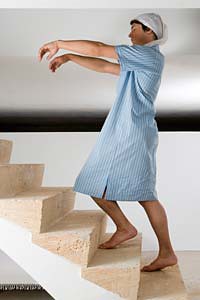Sleepwalking is usually experienced by children aged 8 and 12 years, and does not include health problems that require treatment. Climb out the window, peeing in trash cans or cabinets is a dangerous sleepwalking behaviors. Can occur at any age.
1. Talking or moving rigidly
2. 2. Eyes glaze or sheen
3. Sitting on the bed and open the eye position
4. If having a nightmare, then the patient will scream
Sleepwalking usually occurs one to two hours after falling asleep, in the early evening. Sleepwalking getting lost when a teenager due to a decreased amount of deep sleep. And sleepwalking is common in children.
Many factors can contribute to sleepwalking include:
1. Lack of sleep
2. worry
3. Sleeping in a foreign environment
4. fatigue
5. Medications, such as zolpidem (Ambien)
6. stress
Using of alcohol, illegal drugs or certain medications including some antibiotics, antihistamines, sedatives and sleeping pills can trigger sleepwalking. Usually there is no treatment is required to sleepwalking. If you see your child or someone else to sleep while walking home, guide him back to bed gently.
If sleepwalking leads to excessive daytime sleepiness or pose a risk of serious injury, the doctor may recommend treatment. The use of benzodiazepines or certain antidepressants in the short term can stop sleepwalking episodes. If sleepwalking is associated with medical or mental health condition, treatment directed at the underlying problem.

No comments:
Post a Comment